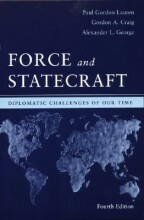Summary: Force And Statecraft | 9780195162493 | Paul Gordon Lauren, et al
- This + 400k other summaries
- A unique study and practice tool
- Never study anything twice again
- Get the grades you hope for
- 100% sure, 100% understanding
Read the summary and the most important questions on Force and statecraft | 9780195162493 | Paul Gordon Lauren, Gordon A. Craig, Alexander L. George.
-
1 The Emergence of Diplomacy and the Great Powers
-
Compare & contrast diplomatic practice in Ancient Greece with that of Rome
Both helped to develop diplomatic practises that are still valuable but in different approaches. For the Greeks, who saw big competition between city states and feared violent outbreaks, diplomacy became a mean to reduce the level of competetiveness and increase interaction among players.
The romans set the foundation of international law and administrative rules, they were also more 'aggressive'
-
What innovation did Venice introduce to diplomacy?
They established the idea of embassies (having representatives outside their countries and vice versa), and introduced the concept of constant diplomatic services and not only ad hoc ones.
-
What was the argument between duRosier and Barbaro?
DuRosier thought diplomats should always strive for peace when negotiating, Barbaro on the other hand thought they should always pursue the states’ interests.
-
What sort of criticism/praise did Macchiavelli’s treatise on statecraft elicit?
Machiavelli's treatise was very controversial. It said a prince had to have two faces- two ways of behaving. The criticism mainly went against his untraditional and unchristian view. However,
other statesmen praised his work as it justified the methods and objectives that states had to increase their political power- the end justifies the means. -
What was Richilieu’s maxim of statecraft?
It was mainly about power, centralizing ministry of external affairs, few limits. It was one of the first diplomatic cores ever made.
-
What were the characteristics of the modern state?
The modern state that developed in the 17th century had three main characteristics: it had an effective army, it had a functioning bureaucracy and it finally the state had to define its interests in rational and practical ways.
-
What was the Peace of Westphalia, and why was it significant?
The Peace of Westphalia ended both the 80 and the 30 Years War and set forward important concepts. It stated the idea of states being sovereign and being able to independently choose for their own people. It affirmed the idea that states didn’t depend from an external power, and that they were equal to one another.
-
What is the historic background of ‘Balance of Power’ in Europe?
France became an overpowering and threatening country, so other alliances were formed to resist this threat. This was done in the treaty of Utrecht, Willem of Orange together with England and the Hapsburgs formed an alliance surrounding France. -
Why was deCallieres’ work on diplomacy considered a ‘mine of political wisdom’?
it enunciated several abilities and qualities that a diplomat should have. Among these were patience, creativity, self-control, and agreeable manners. He also suggested that small conference were preferred over large ones and also explained how lawyers should not be employed as diplomats especially in negotiations. Another main point in his treaty is that he introduced the idea of having professional trained diplomats and not people who had political or other connections.
-
What was the concept of raison d’etat/Staatsrason? Who opposed it, and what finally convinced others it needed to be replaced as a ‘guiding philosophy’ of states?
It was about the idea that the states' interests should always come first. Countries pursue national interest and broadening living space. Among others, Grotius and Vattel opposed this concept but the society at the time did not listen to them.
- Higher grades + faster learning
- Never study anything twice
- 100% sure, 100% understanding

































